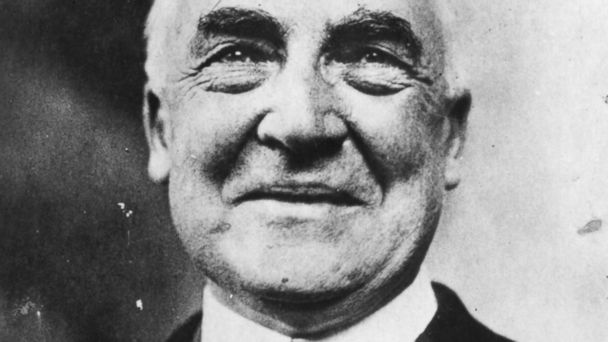Harding's Love Notes to Mistress May Help His Image, Historians Say

(Topical Press Agency/Getty Images)
The now notorious love letters of former President Warren Harding may, ironically, be the basis of a belated campaign to improve the image of the man generally considered to be one of the country's worst presidents.
Harding's grandnephew Richard Harding made the case before a packed Library of Congress assembly Tuesday by saying, "It is with some ambivalence, but with a sense of history, that we are present."
Richard Harding and a battery of historians and archivists said Tuesday that the salacious letters - some of them 40 pages long - give new insight to the man who has been called America's worst president.
"Warren Harding doesn't need protecting. He needs honest and hard-working historians to tell the story like they see it," Richard Harding told the gathering.
The roughly thousand pages were written by Harding between 1910 and 1920 to Phillips, when Harding was lieutenant governor of Ohio and a U.S. senator. They were found in 1964 but protected by the Harding family, which gave the collection to the Library of Congress on the condition that they be held in a safe for 50 years. The letters will become available to the public next Tuesday.
The panel included James Robenalt, author of The Harding Affair: Love and Espionage During the Great War, James Hutson, chief of the Manuscript Division at the Library of Congress, Library of Congress archivist Karen Femia, and Richard Harding.
Robenalt, who published a smaller trove of microfilms of Harding letters in his book in 2009, referred to the correspondence as "one of the great stories of the 20th century."
The allure of the letters centers on Harding's often explicit relationship with Phillips, who Robenalt ventures was a German spy who managed to discourage Harding from running for president in 1916, right in the middle of World War I. The affair ended when Phillips blackmailed Harding after entering the White House in 1921.
A sampling of the letters Robenalt discovered at the Western Reserve Historical Society gives an indication as to what's coming next Tuesday when historians can start crafting what could be an entirely new portrait of Harding. In one letter to Phillips on Sept. 15, 1913, Harding writes, "I hurt with the insatiate longing, until I feel that there will never be any relief until I take a long, deep, wild draught on your lips." On Jan. 5 the same year, he wrote to Phillips: "…so I got up, had a luxurious bath and donned my bathrobe in which to breakfast. Three weeks ago [the robe] touched and covered your beautiful form, and that made it hallowed to me, and I wanted contact with it, to make me seem nearer to you."
The standard interpretation of Harding was that he was "an intelligent man, too trusting of his cronies, too passive as a leader…and too passive for a nation that needed activist leadership," as the historian Gary Alan Fine put it. Harding's administration is notorious for the Teapot Dome scandal, an oil leasing scandal that consumed one of Harding's top cabinet members.
The panel Tuesday argued that his image is still much more imprecise than most historians assume.
Femia claimed that Harding's legacy "was like an empty room, an echo chamber for rumor, gossip, and absolute fabrication." Hutson agreed, using his introduction as something of a call to those in the room to fill the gaps in Harding scholarship.
"It's astonishing the amount of misinformation about Harding, and everyone connected to him," Hutson added. "The question arises: what's wrong with the picture here? Why didn't historians correct this stuff?"
The letters may reveal that Harding's infatuation with Phillips delayed his ascension to the White House, and perhaps caused an entirely different outcome to the Great War and the trajectory of 20th-century American history since Harding, at Phillips' urging, wanted to keep America out of the war.
"Had Harding become president in 1916, and he had a good chance to do so, the world would have been a lot different," Robenalt said. "The world changed because of this relationship."